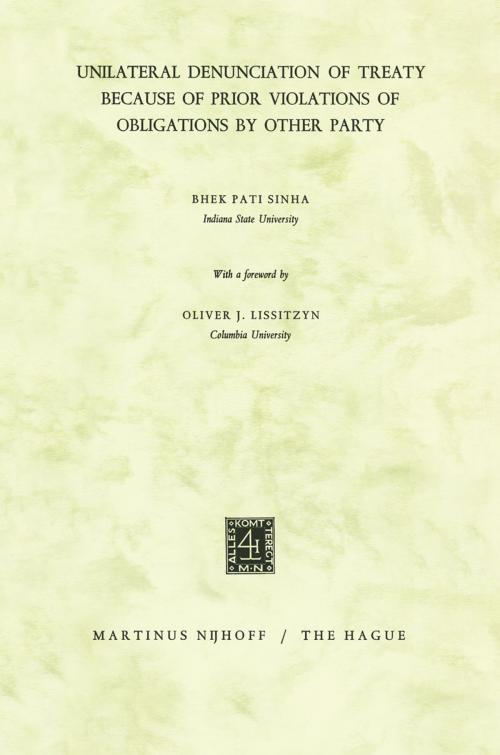Unilateral Denunciation of Treaty Because of Prior Violations of Obligations by Other Party
Nonfiction, Social & Cultural Studies, Political Science, Politics, History & Theory, History| Author: | Bhek Pati Sinha | ISBN: | 9789401196000 |
| Publisher: | Springer Netherlands | Publication: | December 6, 2012 |
| Imprint: | Springer | Language: | English |
| Author: | Bhek Pati Sinha |
| ISBN: | 9789401196000 |
| Publisher: | Springer Netherlands |
| Publication: | December 6, 2012 |
| Imprint: | Springer |
| Language: | English |
In a world still divided into sovereign states and possessed of no institutions for comprehensive centralised regulation of transnational interests and activities, treaties are steadily increasing in number and importance as an imperfect but indispensable substitute for such regulation. Through multilateral conventions, the world community seeks to establish widely accepted standards of state conduct in the general interest; and many international agreements are concluded for the purpose of regulating the relations between two or more states by creating contractual bonds of reciprocal nature between them. Despite the non-existence of anything resembling a world govern ment with effective power to enforce international law, most treaties are observed with a high degree of regularity. States normally carry out their treaty commitments because it is in their interest to do so. A treaty is made because two or more states have a common or mutual interest in establishing a new relationship or modifying an existing one. The natural penalty for the violation of a treaty establishing or regulating a mutually desired relationship is the disruption or im pairment of the latter. When national policies change, clauses per mitting termination or withdrawal by a unilaterally given notice often serve as safety valves which prevent pressures for treaty violations from building up. But there remains a residue of situations in which a state fails to live up to its obligations under a treaty still in force.
In a world still divided into sovereign states and possessed of no institutions for comprehensive centralised regulation of transnational interests and activities, treaties are steadily increasing in number and importance as an imperfect but indispensable substitute for such regulation. Through multilateral conventions, the world community seeks to establish widely accepted standards of state conduct in the general interest; and many international agreements are concluded for the purpose of regulating the relations between two or more states by creating contractual bonds of reciprocal nature between them. Despite the non-existence of anything resembling a world govern ment with effective power to enforce international law, most treaties are observed with a high degree of regularity. States normally carry out their treaty commitments because it is in their interest to do so. A treaty is made because two or more states have a common or mutual interest in establishing a new relationship or modifying an existing one. The natural penalty for the violation of a treaty establishing or regulating a mutually desired relationship is the disruption or im pairment of the latter. When national policies change, clauses per mitting termination or withdrawal by a unilaterally given notice often serve as safety valves which prevent pressures for treaty violations from building up. But there remains a residue of situations in which a state fails to live up to its obligations under a treaty still in force.















